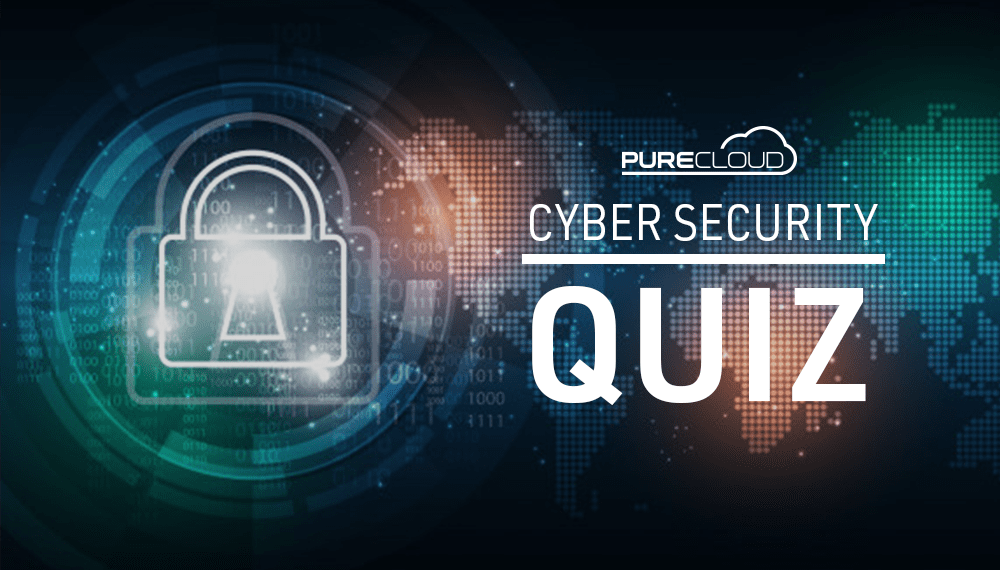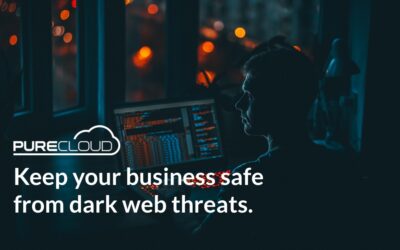Cyber security attacks are on the rise and criminals are getting more sophisticated in their methods, especially when it comes to targeting staff. DID YOU KNOW – 90% of all cyber breaches are the result of human error? So can you be confident in saying your business is really cyber secure?
The reality is, with an increase of attacks, businesses need to do more to ensure they are cyber secure so they can protect themselves against possible online threats. Take our cyber security quiz by answering the following 10 questions and find out if you’re cyber savvy or could do with more training.
Q1. Microsoft emails asking you to reset your password. Your next step is?
A) Ignore the email & delete it
B) Follow the link & reset your password
C) Reset your password manually
A
B
c
This is a phishing attempt from an untrustworthy source. If you are using Microsoft, a password reminder will alert your desktop, not your email address. Always use caution when dealing with emails and never click links unless you’re 100% sure they’re legitimate. Even then, you can check links by hovering over the link with your mouse and reading the destination format.
Q2. You’re resetting your password – which should you choose?
A) C!@rk-I7
B) ih1bopedblfw
C) iFinishWorkat5everyday!
A
B
C
When it comes to passwords, think ‘length over complexity’. The longer the password, the stronger it actually is and the more cyber secure you are. Replace the term ‘Password’ for ‘Passphrase’ and try to include a combination of upper/lowercase letters, numbers and symbols to make it even harder to crack.
Q3. A hacker locks out users & encrypts files & data until the user agrees to pay a sum. What is this called?
A) Hacking
B) Ransomware
C) Phishing
A
B
c
In total, more than 4,000 ransomware attacks occur daily, representing an increase of over 300 percent since 2015. The most infamous outbreak of ransomware is Wannacry, which swept through systems globally, including the NHS, in May 2017.
Q4. What should you do if you’re the target of a ransomware attack?
A) Send an email to the IT guy in the office
B) Disconnect your computer from the network
C) Pay the ransom. You need your files back!
A
B
c
You should never give into the attacks by paying the ransom. The best thing to do with a potential ransomware attack is to isolate your computer in the first instance. By disconnecting it from the network, you stop other devices from being infected too and this is a great first step. Afterwards, contact the IT department to handle the issue who will work out the course of action.
Q5. You find a USB stick on the floor. What do you do?
A) Pick it up, plug it in & find out who it belongs to, so you can return it
B) Leave it where it is. It’s not your problem
C) Hand it into reception for them to deal with
A
B
c
An unidentified hard drive could cause serious problems if plugged into any device such as potential viruses and cyber threats that could infect your network. If you find a USB, it is always best to hand it in to reception or a senior member of staff so they can discover if it belongs to anyone. Curiosity usually kills the cat.
Q6. What do drive-by attacks do?
A) Trigger malware installations in response to clicking a link
B) Trigger malware installations in response to visiting websites
C) Trigger malware installations in response to attending a webinar
A
B
c
You don’t have to click anything at all to initiate a malicious download in a drive-by attack but the effects on your data, files, reputation and bottom line can be huge. That’s why firewalls and up-to-date antivirus software are essential in helping you stay protected and cyber secure.
Q7. Which of the following statements is true about GDPR?
A) GDPR is closely related to IT & cyber security
B) GDPR only applies to companies located in Europe
C) There is no financial penalty for non-compliance
A
B
c
GDPR rules apply to all EU company as well as companies that look after the data of EU users. In the event of a data breach, GDPR forces companies to inform the relevant authorities within 72 hours and provide full details of the breach, while proposing measures for mitigating its effects. Hefty fines are awarded to those that fail to comply or experience a breach.
Plus, you must be able to prove that you have robust defences and sufficient measures in place to protect data. Therefore, a comprehensive data security strategy is now more important than ever before.
Q8. Which of these is a way of spotting a phishing email?
A) Email request personal information
B) Urgency or fear evoking language
C) Poor spelling or grammar
A
B
c
It’s a bit of a trick question as it’s actually all three when spotting phishing attacks. Legitimate companies never email to ask for sensitive information like passwords or account numbers. And if they’re a reputable, their communications will contain flawless spelling and grammar. If there’s lots of spelling mistakes, you might be being phished.
Be cautious of emails that urge you to do something that you feel is rushed or wrong and always double check with colleagues if you feel pressured into sending sensitive details, data, or money.
Q9. What is a man in the middle attack?
A) When cyber criminals intercept data sent via the internet
B) When criminals pretend to be someone you trust
C) When cyber criminals hijack websites you use
A
B
C
When connected to an unsecured public network, it’s possible for criminals to see things like your emails and your passwords when you log in to online accounts.To stop this from happening, you should always use a VPN to keep you protected when using public WiFi.
Q10. Why is it important to update systems and devices?
A) To benefit from new features
B) So you don’t get locked out of them
C) To avoid security vulnerabilities
A
B
c
Out of date technology, systems and devices that require an update protect you from cyber criminals. While they may seem annoying, they’re not pointless and do a very important job. Updates can fix known security glitches or vulnerabilities that hackers might exploit. So when prompted to, it’s worth installing or purchasing updates quickly. You can also find more tips to staying cyber secure and avoiding data breaches: click here.
how did you do?
0-4? UH-OH you need help!
Don’t worry, you’re not alone. Remember – 90% of attacks are due to human error. Luckily, with a bit of training on what threats are out there & how to spot them, you’ll be cyber secure in no time – contact us for help!
5 – 8? Room for Improvement!
So you’re not exactly a cyber security novice, but you could still be vulnerable to cyber attacks if caught off guard. Maybe your technology is outdated or you need training to brush up on some weak spots – we can help!
9-10? You’re Cyber Savvy!
Congrats, you’re pretty cyber secure, but cyber criminals are always adapting their techniques to catch you out. Stay alert, test yourself regularly and keep up to date with security news. Share this quiz with colleagues to see how they get on!
we’re cyber security experts!
Pure Cloud Solutions have dedicated cyber security experts with a wealth of knowledge on the cyber threat landscape, common and upcoming attacks as well as the technology you could implement to keep the criminals at bay.
We can review your current cyber security measures for FREE at your convenience to see if you could be doing more to protect your business. Plus we’ll give you a 10% discount to use against a solution. Simply fill in your details and we’ll be in touch!
Ensure your staff are cyber secure!
Cyber security training doesn’t need to be time consuming or boring. Our cyber security staff training platform Cybsafe simulates real attacks and guides users through interactive training modules. It’s effective, cloud-based and that promotes a shift in cyber security culture within businesses.
Call us on 0333 150 6780, email or fill out the contact form below and a member of the team will be in touch.





Recent Comments